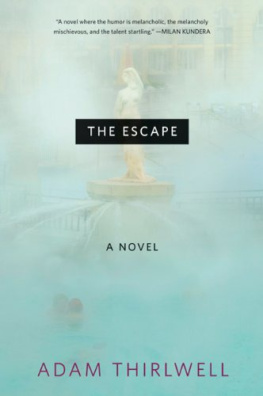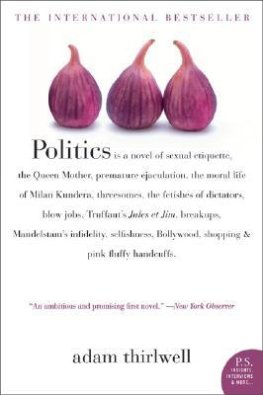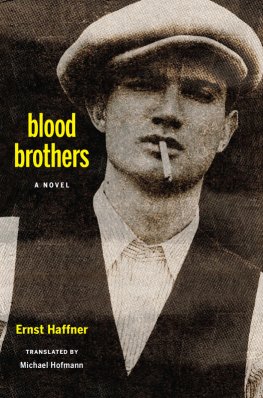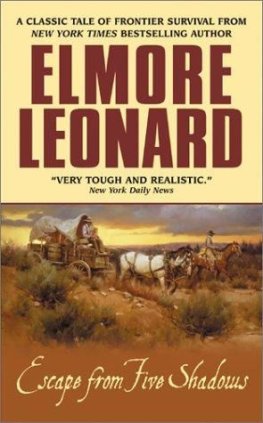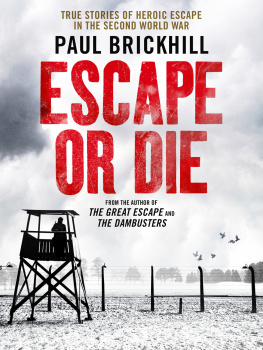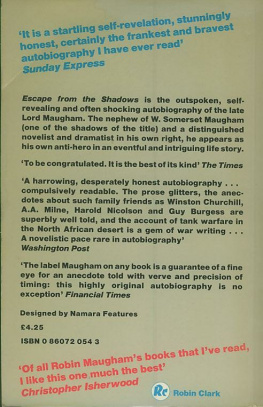ALSO BY ADAM THIRLWELL
Politics
The Delighted States
THE ESCAPE
THE ESCAPE
A NOVEL
ADAM
THIRLWELL
FARRAR, STRAUS AND GIROUX
NEW YORK
Farrar, Straus and Giroux
18 West 18th Street, New York 10011
Copyright (c) 2009 by Adam Thirlwell
All rights reserved
Printed in the United States of America
Originally published in 2009 by Jonathan Cape, Great Britain
Published in the United States by Farrar, Straus and Giroux
First American edition, 2010
Library of Congress Cataloging-in-Publication Data
Thirlwell, Adam, 1978-
The escape : a novel / Adam Thirlwell. -- 1st American ed.
p. cm.
ISBN: 978-0-374-14878-2 (ha : alk. paper)
1. Older men--Sexual behavior--Fiction. 2. Adultery--Fiction. 3. Inheritance and succession--Fiction. 4. Alps Region--Fiction. I. Title.
PR6120.H575E83 2010
www.fsgbooks.com
10 9 8 7 6 5 4 3 2 1
TO ALISON,
FOR MY FAMILY
Contents
PART ONE
Haffner Unbound
And so the century ended: with Haffner watching a man caress a woman's breasts.
It was an imbroglio. He would admit that much. But at least it was an imbroglio of Haffner's making.
He might have been seventy-eight, but in Haffner's opinion he counted as young. He counted, in the words of the young, as hip. Or as close to hip as anyone else. Only Haffner, after all, would have been found in this position.
What position?
Concealed in a wardrobe, the doors darkly ajar, watching a woman be nakedly playful to her boyfriend.
This was why I admired him. Haffner Unbound! But there were other Haffners too - Haffner Pensive, Haffner Abandoned. He tended to see himself like this; as in a dream, in poses. Like the panels of a classical frieze.
A tzigani pop album - disco drumbeats, accordions, sporadic trumpets - was being broadcast by a compact-disc player above the minibar. This weakened his squinting concentration. He disliked the modern zest for sex with music. It was better, thought Haffner, for bodies to undress themselves in the quiet of the everyday background hum. In Naples once, in what, he had to say, could only be described as a dive, in the liberated city, the lights went suddenly out, and so the piano stopped, and in the ensuing silent twilight Haffner watched a woman undress so slowly, so awkwardly, so peacefully - accompanied only by the accidental chime of wine glasses, the brief struck fizz of matches - that she had, until this moment, more than fifty years later, remained his ideal of beauty.
Now, however, Haffner was unsure of his ideals.
He continued looking at Zinka. It wasn't a difficult task. Her hair was dark; her nipples were long, and almost black, with stained pools of areolae; her stomach curved gently towards her hips, where the bone then steeply rose; her legs were slender. Her breasts and nose were cute. If Haffner had a type, then this was it: the feminine unfeminine. The word for her, in his heyday, would have been gamine. She was a garconne. If those words were, he mused, at the end of his century, still used for girls at all.
They were not.
A suckling noise emerged from Niko, who was now tugging at Zinka's nipples with the pursed O of his mouth.
Haffner was lustful, selfish, vain - an entirely commonplace man. It was the unavoidable conclusion. He had to admit it. In London and New York he had practised as a banker. His life had been unre-markable. It was the twentieth century's idea of the bourgeois: the grey Atlantic Ocean. The horizontal fretting waves of the grey Atlantic Ocean. With Liberty at one extreme, and the Bank of England at the other. But Haffner wasn't straddling the Atlantic any more. A hotel in a spa town was now Haffner's temporary home. He was landlocked - adrift in the centre of Europe, aloft in the Alps.
And now he was hidden in a wardrobe.
He was not, however, the usual voyeur. It was true that Niko was unaware of his presence. But Zinka - Zinka knew all about this spectral form in the wardrobe. Somehow, in a way which had seemed natural at the time, Zinka and Haffner had developed this idea of Haffner's unnatural pleasure. The causes were obscure, occasioned by some random confluence of Haffner's charm and the odd mixture Zinka felt of tenderness for Haffner and mischief towards her boyfriend. But however obscure its causes, the conclusion was obvious.
So, ladies and gentlemen, maybe Haffner was grand, in a way. Maybe Haffner was an epic hero. And if Haffner was a hero, then his wallet, with its creased photographs, was his mute mausoleum. Take a look! Haffner in Rome, wonkily crowned by the curve of the Colosseum, a medusan mess of spaghetti in front of him; Haffner and Livia at a garden party in Buckingham Palace, trying to smile while hoping that Livia's hat - a plate on which lay a pile of flowers - would not erupt and blow away; Haffner's grandson, Benjamin, aged four, in a Yankees baseball cap, pissing with cherubic abandon - a live Renaissance fountain - in the gardens of a country house.
All photo albums are unhappy, in the words of the old master, in their own particular way.
And me? I was born sixty years after Haffner. I was just a friend.
I went to see him, in a hospital on the outskirts of London. His finale in the centre of Europe had been a decade ago. Now, Haffner was dying. But then Haffner had been dying for so long.
--The thing is, he said, I just need to plan for the next forty-eight hours. We just need to organise the next few days of the new era.
And when I asked him what new era he meant, he replied that this was exactly what we had to find out.
Everything was ending. On the television, a panel was discussing the crisis. The money was disappearing. The banks were disappearing. The end, as usual, was continuing. I wasn't sorry for the money, however. I was sorry for Haffner. There was a miniature rose in bud on the table. Haffner was trying to explain. Something, he said, had gone very very wrong. Perhaps, he said, we just needed to get this closed - pointing to a bedside cabinet, whose lock was gone.
He was lower than the dust, he told me. Lower than the dust. After an hour, he wanted to go to the bathroom. He started trying to undress himself, there in his armchair. And so I called a nurse and then I left him, as he was ushered into the women's bathroom, because that bathroom was closer to the room in which Haffner was busily dying.
Standing in the hospital's elliptical concrete drive, as the electric doors opened and closed behind me, I waited for the taxi to take me to the trains - back to the city. Across the silver fields the mauve fir trees kept themselves to themselves. It was neither the country nor the city. It was nowhere.
And as I listened to the boring sirens, I rehearsed my memories of Haffner.
With my vision of Haffner - his trousers round his ankles, his hands nervous at his cream underwear - I began my project for his resurrection. Like that historian looking down at the ruins of Rome, in the twilight - with the tourists sketching their souvenirs, and the bells beginning, and the pestering guides, and the watersellers, and the sun above them shrinking: the endless and mortal sun.
His career had been the usual success story. After the war Haffner had joined Warburg's. He had distinguished himself with the money he made in the exchange crisis. But his true moment had arrived some years later, when it was Haffner who had realised, as the fifties wore on, the American crisis with dollars. Only Haffner had quite understood the obviousness of it all. The obtuseness of Regulation Q! Naturally, more and more dollars would leave, stranded as they were in the vaults of the United States, and come to Europe - to enrich themselves. This was what he had explained to an executive in Bankers Trust, who was over in London to encourage men like Haffner to move to New York. In 1963, therefore, Haffner left Warburg's for America, where he stayed as a general manager for eleven years. He was the expert in currency exchange: doyen of the international. Then, in 1974, he returned as Chief General Manager in the London office of Chase Manhattan. Just in time for the birth of his grandson - who had promised so much, thought Haffner, as another version of Haffner, and yet delivered so little. Then, finally, there came Haffner's final promotion to the board of directors. His banishment, joked Haffner.

